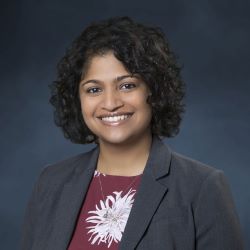Experience a robust clinical education, leadership opportunities, and a chance to work with underserved populations.
Meet the Director:
Welcome to the Land of Enchantment! We are happy to introduce you to our Child Neurology Residency program. Our mission, as a program, is to guide you on your individual journey from medical school to practice. This allows our residents the independence to make and achieve their own goals. Regardless of your chosen path, we are confident that we can provide the experiences and mentorship you need.
Our child neurology residents work as team leaders during their PGY-4 and PGY-5 years, helping guide the patient care plan as well as educating families, medical students, pediatrics residents, and adult neurology residents. Residents are actively involved in selecting the topics for conferences and curriculum changes.
We are part of the only dedicated Children’s Hospital, the only Level 1 trauma center, the only Advanced Care Stroke Center, the only Comprehensive Epilepsy center, and the only MDA Care Center within 400 miles in any direction. The majority of our patients come from underserved minorities living in rural areas.
Recent graduates of our residency have matched into fellowships at Stanford University, Boston Children’s Hospital, Northwestern University, University of California San Francisco, and Washington University. Our graduates have found success in both academic and private practice careers.
Choosing a residency can be both exciting and potentially overwhelming. Please reach out to us early on; we are happy to help guide you through the process. New Mexico could be a good fit for you!


Explore the UNM Department of Neurology's Virtual Campus Experience and what being a Neurology resident at UNM means.
We are an ACGME accredited, categorical, five-year combined Pediatrics-Child Neurology residency. All trainees will meet requirements to be board eligible in both Pediatrics and Neurology with special qualifications in child neurology. Trainees participate in the clinical and classroom experiences to ensure they feel confident and prepared to take boards. Residents take the AAN resident in-training exam (RITE) each year to help set priorities for their learning and studying.
The first two years of residency provide our residents a robust understanding and appreciation of pediatrics care. This training also leaves our residents board eligible in pediatrics after they complete their neurology training.
Our pediatrics facilities provide a wonderful learning environment. UNM Children’s Hospital is the only dedicated children’s hospital in New Mexico. The pediatrics faculty create wonderful opportunities to learn pediatrics in a rigorous and supportive environment. Residents start ICU rotations including NICU and PICU during intern year, which gives additional early exposure to complex neurologic care.
Abiding by national requirements, we ensure that our residents have exposure to twelve months of adult neurology. Instead of assigning residents to pre-defined adult rotation, we work with our residents to assess and address their interests and learning needs to provide the most appropriate clinical exposure between different inpatient and outpatient experiences.
Residents have opportunities to work inpatient on the general neurology inpatient service, stroke (cerebrovascular) service, consult service, epilepsy monitoring unit, and Neuro ICU. They have the flexibility to attend an array of different neurology subspecialty clinics including movement disorders, neuroimmunology, neuromuscular, behavioral neurology, and sleep clinic. We also have popular electives in neuroradiology, neuropathology, and neuro-ophthalmology.
Although our residents have traditionally chosen to complete all of their adult training in their PGY-3 year, we have the flexibility to schedule adult neurology rotations in any order to most appropriately meet learning needs.
During PGY-3 year, our residents begin their continuity clinic in Pediatric Neurology and only take night and weekend call for the Pediatric Neurology service. Optional experiences for night call in adult neurology are available for residents if they so choose.
During the 24 months of child neurology, trainees participate on inpatient service, outpatient clinics, and electives.
Our inpatient service is primarily a consult service; however, we do admit several patients per week to our epilepsy monitoring unit for scheduled continuous video EEG. The patients we typically follow are primarily managed by the pediatric hospitalists, the pediatric oncology service, the PICU, the NICU, or a surgical service. We also consult on patients in the ER and urgent care. Our faculty support our residents in taking an active role leading the team to help them prepare for the rigors and responsibilities of independent practice.
Most of our outpatient experiences are structured for residents to follow their own patients rather than shadowing, or seeing an attending’s patients. This allows our residents to form long term relationships with their patients and families. We also ensure that residents continue to follow complicated patients with rare disease rather than referring them to an attending subspecialist clinic.
Popular electives in pediatric neurology include epilepsy (including ketogenic diet clinic), neurophysiology (EEG and/or EMG), pediatric sleep, neurogenetics, neonatal neurology, neuromuscular, and research/QI electives.
In the postgraduate years 3 through 5, our residents take home call, but do not have overnight call in the hospital. Our PGY-3 residents start their neurology training with a month as a junior on the inpatient child neurology team to help them prepare for home call. Attending physicians are always available to talk through cases with residents.
During years 3-5, most of our didactics are combined with adult neurology residents. Daily lectures from noon to 1pm cover adult and pediatric topics in addition to special sessions for neuroanatomy, neuroradiology, quality improvement, and morbidity and mortality. In addition to these didactics, we have weekly grand rounds and a weekly Child Neurology case conference.
The Residents as Educators Program seeks residents and fellows with an interest in teaching now and potentially in future academic practice. During a two-day conference, participants gain recognition for their educational contributions and further develop their expertise as educators. All of our past residents have successfully applied for this program.
The Office for Medical Educator Development (OMED) guides and supports the professional development and advancement of medical educators in the UNM School of Medicine. OMED provides workshops, online resources, individual consultation, and customized learning opportunities to faculty and residents, programs and departments.
We encourage all of our residents to form a long-term research or quality improvement project spanning all 3 years of neurology training. Past residents have successfully completed projects in both clinical and basic science research. Research mentors have included faculty in child neurology, adult neurology, neonatalogy, and neuroscience departments. The Neurology department hosts an annual resident research day where projects are presented, but we also strongly support presentation at national or international conferences.







Current Residents:



|
| Name | Match/Position |
| Bret Gardner, MD, PhD | Instructor of Pediatrics, Division of Pediatric Neurology, University of Utah Hospital |
| Sarah Otterson, MD | Pediatric Fellowship at Medical College of Wisconsin Affiliated Hospitals, Inc. |
| Francesca Giovanna García, MD | Pediatric Fellowship at USCF (University of California San Francisco) Assistant Professor, Child Neurology University of New Mexico. |
| Alan Mason, MD , PhD | Pediatric Epilepsy Fellowship at Children's Hospital Colorado. Assistant Professor, Child Neurology University of New Mexico. |
| Harsheen Kaur, MD | Pediatric Epilepsy Fellowship at Stanford |
| Rujul Desai, MD | Pediatric Epilepsy Fellowship at Stanford |
| Danny Rogers, MD, PhD | Child Neurology Program Director, University of New Mexico |
| Kathy Wolfe, MD | Sleep Medicine Fellowship at University of New Mexico Assistant Professor, University of New Mexico |
| Joseph Harmon, DO | Pediatric Epilepsy Fellowship at Boston Children’s Hospital Lieutenant Commander, Naval Medical Center, San Diego California |
| Dave Shahani, MD | Pediatric Epilepsy Fellowship at Northwestern Epileptologist, Cook Children’s Hospital |
| Yasir Khan, MD, MPH | Pediatric Epilepsy Fellowship at Washington University Associate Medical Director for Neuroscience at Takeda Pharmaceuticals |
| Irene Patniyot, MD | Pediatric Headache fellowship at UCSF Medical Director and Fellowship Director for Pediatric Headache, Texas Children’s Hospital/Baylor College of Medicine |
Most of our residents cite the collegiality of our program as its strongest asset. Feeling engaged with and supported by the faculty helps create a positive learning environment. Graduates have felt well-prepared for fellowships or independent practice. Additionally, our residents appreciate the call schedule. Learn more about resident life at UNMH!

Our patient population is multicultural and diverse. We see complicated cases from all over New Mexico. UNM Hospital is the only Level 1 Trauma Center in New Mexico.
Residents benefit from the collaborative atmosphere of UNM Neurology. Faculty and students communicate on a first-name basis. Graduates of the program praise the close-knit community of the department. In addition to strong mentorship and supportive faculty, residents have access to many programs for assistance.
The mission of the UNM HSC Wellness Program is to create a culture of wellness on campus by promoting healthy living and bringing wellness activities and opportunities to all HSC faculty, staff and students. Wellness programs offer a variety of services including affordable fitness classes on campus, meditation groups, live music events and healthy living tips to improve your life.
Our 2023-2024 salaries and benefits for residents can be seen below. Updated salary and benefits can be found on the GME office website.
Salaries for 2023-2024:
PGY-1: $62,429.00
PGY-2: $64,453.00
PGY-3: $66,799.00
PGY-4: $69,272.00
PGY-5: $72,273.00
Vacation: 21 days each year
Holiday: 7 days each year
Sick: 21 days each year
Education: 5 days each year
Wellness: 4 half-days each year
Professional: 5 days over residency
Bereavement, catastrophic, family, maternity/paternity, and military leave policies are available to support residents as those needs arise.
Thank you for your interest in our Child Neurology Residency Training Program at UNM School of Medicine in Albuquerque. The residency is focused on a strong education and provides graduated responsibility to foster leadership skills. Our residency will prepare you for academic, inpatient/outpatient or research-oriented careers.
UNM offers a single combined 5-year program that includes two preliminary years of pediatrics at UNM before beginning the three years of neurology training with one application.
We offer a joint interview experience over 1 day with the selection committee including members of the Child Neurology faculty and Pediatrics faculty.
Although we hope to expand to accept two residents each year in the future, we currently accept one or two residents in alternate years. All of our current training slots are filled. We plan to match one resident in 2023.
Complete one application using AAMC/ERAS program number 1962185C0. We participate in ERAS and abide by all match rules and policies.
We accept applications until November 30, but our interview slots may be scheduled and filled before that time. For best consideration, please consider sending your application to us the first week that applications can be submitted. Matching is facilitated by NMRP. Register today.
After we have had an opportunity to review your completed application packet, we will contact you regarding an interview. Please feel free to contact us with any questions you may have regarding our residency program.
Applicants must meet the following requirements to be considered for our program. We will not consider applicants who do not meet all of our requirements. You must:
International Medical Graduates should submit documentation through the ECFMG office. Contact the ECFMG directly for further information. In general, most international medical graduates we interview must have: